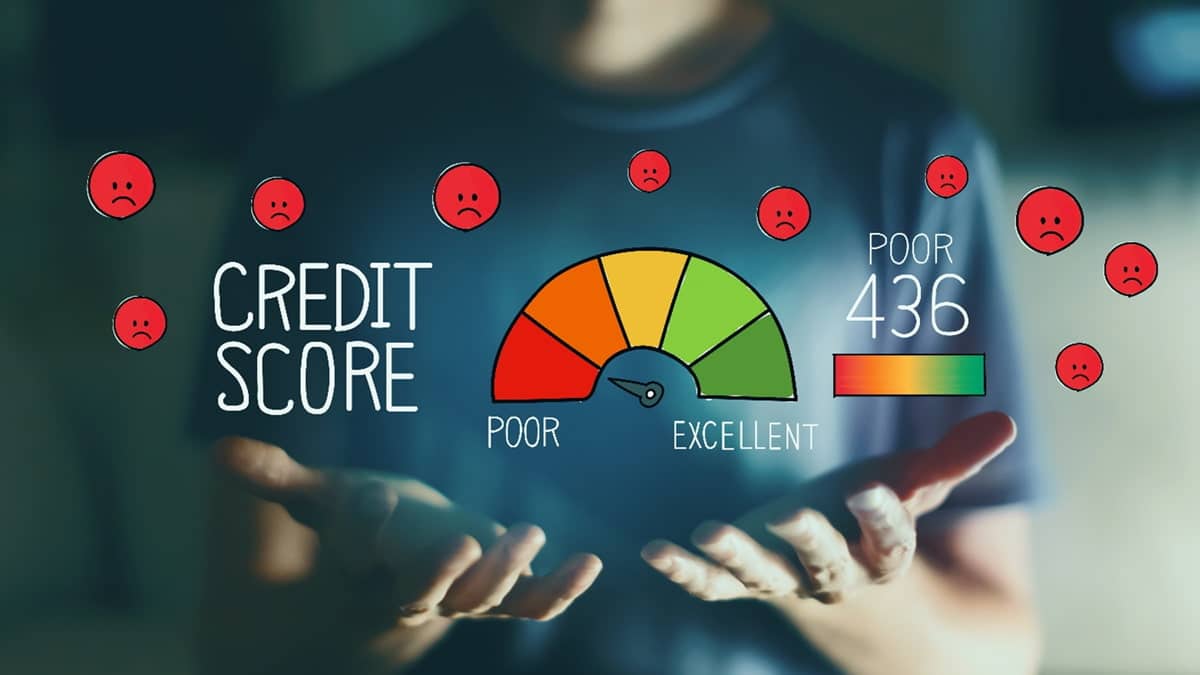Why Did My Credit Score Drop? Here are 7 Possible Reasons
Important Note: When you buy through our links, we may earn a commission. As an Amazon Associate we earn from qualifying purchases. Content, pricing, offers and availability are subject to change at any time - more info.
You check your credit score and your heart plummets to your stomach. “What?” you silently ask yourself. “Why did my credit score drop?”
Advertisement
Your mind instantly races to identity theft, but this may not be the only reason for the sudden decline in your credit score. There are eight possible reasons for the decline. Some you may be personally responsible for, while others can be accidental.
Why Did My Credit Score Drop?
OK, first you need to figure out what’s going on and how do you minimize the damage. Reasons can be as simple as a missed payment or a late payment, or as complex as identity theft. Whatever the cause, you need to deal with it ASAP. Any delay will cause a hit to your score.
Missing or Late Payments
Missed payments sometimes happen. Everything is done electronically, and it is possible to absentmindedly delete your statement. Also, if you have had a major event such as the birth of a child, you were recently married, or you just went on vacation, it is entirely possible to forget to make a payment.
Even if your credit card statement is delivered by mail, it is possible for it to become tangled in with flyers and other junk mail.
Advertisement
Whatever the cause, the result is the same: you had a missed payment, or you paid late. This results in a drop in your credit score. Missed payments account for 35% of the FICO score.
The only solution is to pay it. Once the money is received, you can contact the creditor. You can explain the situation and ask for forgiveness. Contrary to public opinion, many creditors are very compassionate in this situation. They would much rather work with you than against you.
While creditors don’t have to do this, some may, especially if it is a one-off situation. If they agree, then the credit report won’t have a negative mark (which lasts for seven years!)
If, perhaps, you find yourself in a situation where you can’t pay, many creditors are understanding. They will try to work out a beneficial arrangement with you for repayment. Their goal is not to bleed you dry of money, it’s to cover their losses. They are more inclined to work with someone rather than take a hard line unless it’s warranted.
Co-signed a Credit Card Application or Loan
Being the good, kind person that you are, you had agreed to co-sign for a friend or relative’s loan/credit card. They looked you in the eye and promised to be responsible, but they weren’t. If the person skips a payment or generates a large balance, your credit score is affected.
While it may sound nasty, to protect yourself, have the statements sent to your home or obtain account access. This way, you can monitor any activity for trouble. You are then able to address things while they are small before they become a big surprise!
Advertisement
This will avoid you having to make a payment yourself, or risk it having a negative impact on your credit. If it involves a credit card, you can pay it off yourself and close the card. However, you may want to discuss the situation with your family member or friend to work out a mutually beneficial solution.
You may also want to read the header “closed credit card” as well. This can have an impact, too.
Carrying a High Balance/Maxed Out Credit Card
You may have had unforeseeable expenses that you needed to put on your credit card. This is what it is supposed to be used for. However, this may cause your score to drop. Credit utilization is how much of your limit is being used. Ideally, 30% or less of your credit should be used, which will benefit your credit score.
Even if you are under 30% with the purchases, your score may still decrease. Credit utilization accounts for 30% of the FICO score.
In the future, pay down large balances as quickly as possible. Only use a small portion of the available credit. You can also inquire about a higher credit limit. However, if you have an issue with spending, this may not be the best idea.
Credit Limit Has Decreased
If a lender decreases the limit, it will increase the credit utilization ratio, resulting in a lower credit score.
To solve this issue, you can request a lowering of the utilization ratio. The only other alternative is paying down a current balance.
Advertisement
Identity Theft
A sudden drop in your credit score may indicate identity theft. Therefore, it is important to continually monitor your credit score.
While examining your credit report, search for indicators like unfamiliar accounts and places you have never lived. The issue can be resolved, but the sooner it is discovered, the easier the job.
Since identity theft is so prevalent, consider adding a fraud alert to protect yourself in case it happens.
Closed a Credit Card
Many people vow “never again” when it comes to credit card debt. There is nothing more freeing than paying off outstanding debt. Additionally, perhaps the card wasn’t competitive, or it was never used. So, you decided to close the account.
While it seems like the most reasonable solution, losing the credit limit means the overall credit limit is decreased. The credit usage went up, which can cost you your credit score.
Furthermore, if this was an older card, this provides another hit to your credit score. The age of the credit affects the score. However, it isn’t as huge a factor as timely payments or credit utilization.
Before closing an old card, consult with your bank. They may offer a better card, and you could switch.
Recently Applied for Loan, New Credit Card, or Mortgage
When applying for approval, lenders conduct a hard credit check. Each inquiry can drop the credit score temporarily by up to five points annually.
If, though, you are shopping for a mortgage or any other product within a 14–45-day window, it is only considered one hard inquiry.
Advertisement
To reduce the impact of this, only apply for credit when it is necessary.
Paid-off Loans
Getting rid of outstanding debt is always an achievement. However, it will lower your credit score. This is because when a loan is completely paid off, there is one less credit account.
The only thing you can do to counter this is to keep the accounts active, pay in a timely manner, and keep usage low. Your credit score benefits you as your history with credit becomes longer. It will also be filled with positive information, so should you require a future loan, it will be easier to obtain.
It is always advisable to consult with your lender or a credit bureau prior to closing out any account. While it may seem like a positive, it can negatively affect your credit score. If it seems like your bank wants to keep you in debt, that is your opinion. However, it is up to you to use credit responsibly.




 Please Support Me on Ko-fi
Please Support Me on Ko-fi